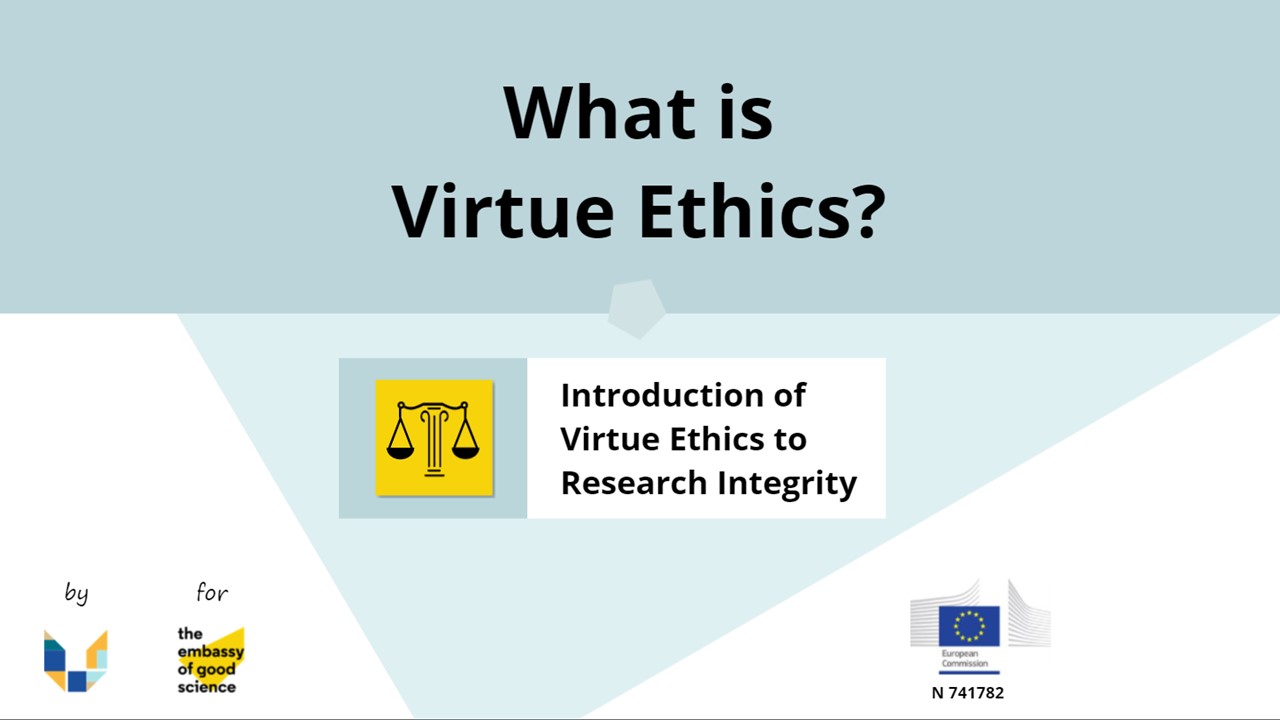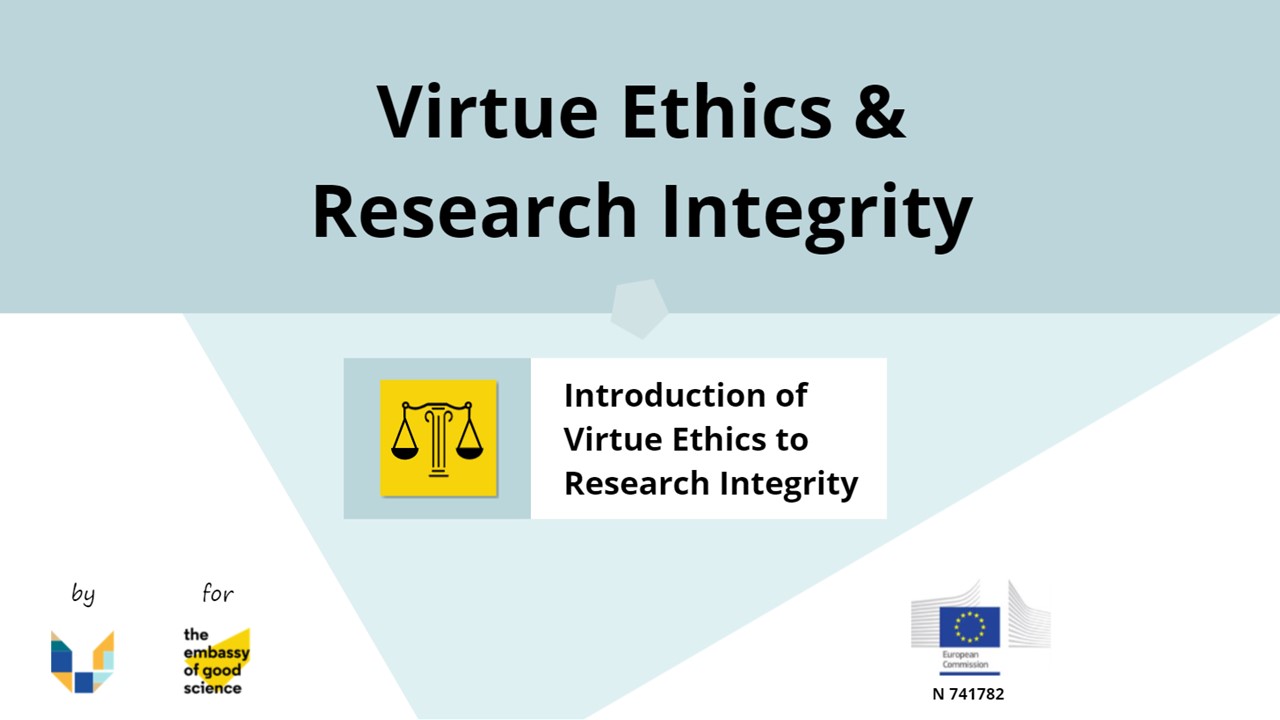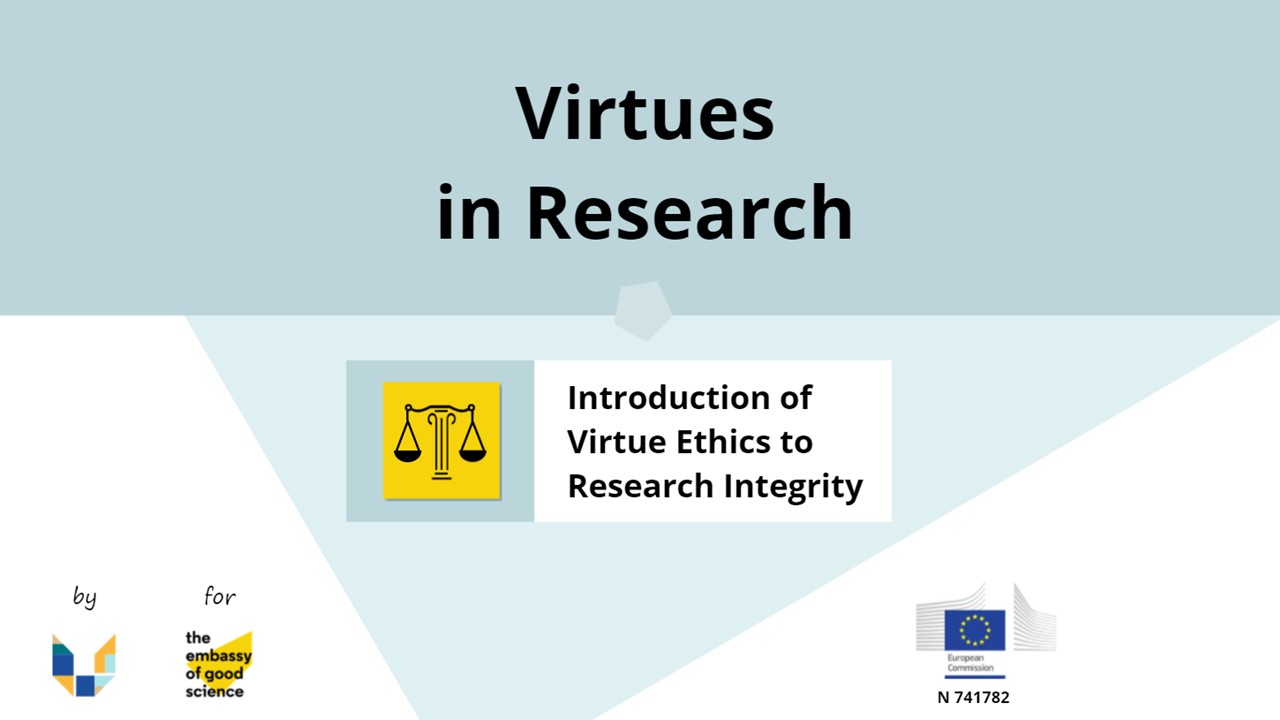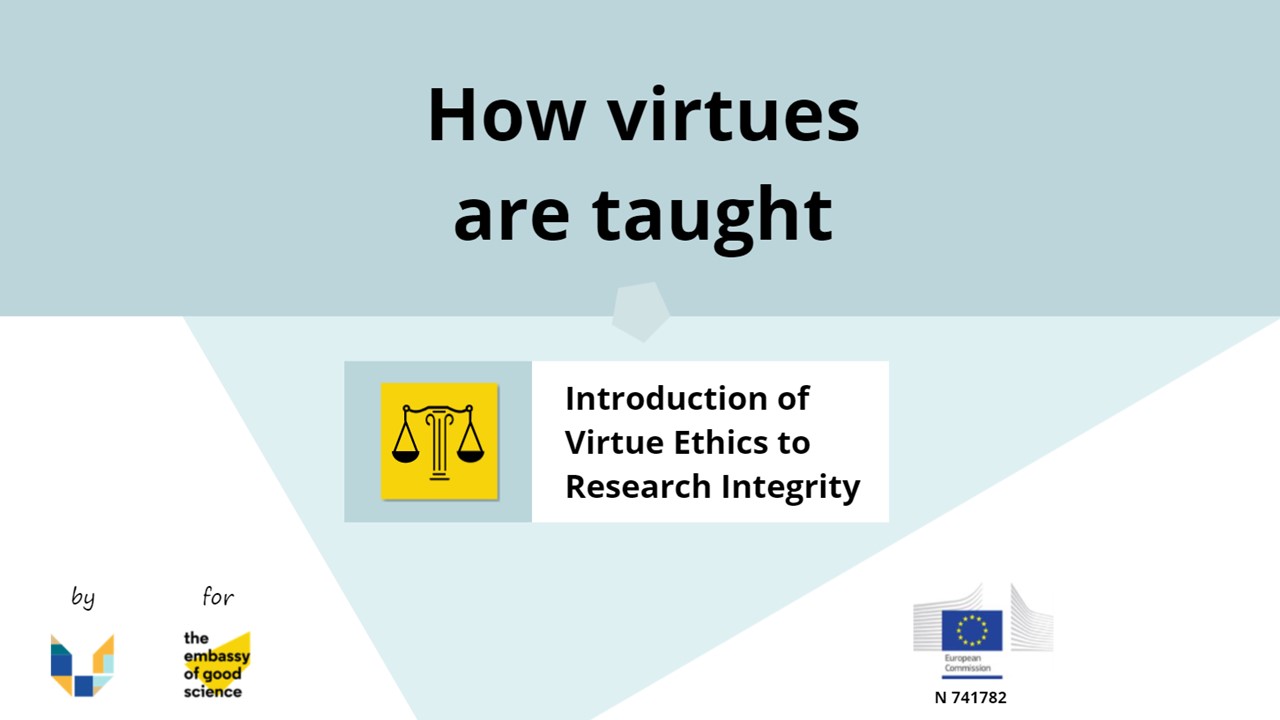Introduction of Virtue Ethics to Research Integrity
Introduction of Virtue Ethics to Research Integrity
This is the second of a four part series. The other two series are: "Introduction to Research Integrity" and "Virtue ethics under current research conditions".
You need to have a background in research (i.e. be employed as researchers) or be a trainer/educator/teacher who has had experience in research in the past.
VIRT2UE Online modules privacy statement
This privacy statement regards the VIRT2UE online modules. The modules are part of the VIRT2UE training program. They are produced by the VIRT2UE consortium and made freely and openly available on the Github platform.
All information of users remains client side
At no point during the use of the VIRT2UE online modules is any personal information collected or saved. Information entered into the modules remains ‘client side’ and is not sent back to servers, nor made available for use by third parties.
Entering personal information in the modules
At some places in the modules the user is invited to type input in open fields. Information entered into these fields is not sent back to any server. None of the entered information can be traced back to the user. It is not obligatory to use these fields. Users can also choose to document their responses elsewhere, for instance on paper.
Contact us if you have any further questions.What is this about?
By taking these interactive modules you will learn about and reflect on:
- Key characteristics of virtue ethics: After watching an introductory video on virtue ethics, you can self-assess your knowledge of the most relevant characteristics of virtue ethics.
- Moral conflict and a moral dilemma: After an introduction to the concepts you will be asked to apply these concepts whilst analyzing two cases from the Rotterdam Dilemma Game, one of which portrays a moral conflict, the other a moral dilemma.
- Your own aspirations to become a more virtuous researcher: After reflecting on your overarching goals as researchers, you will be asked to identify the three most important virtues that describe the kind of researcher you want to be (or become).
- The influence of moral exemplar(s) on moral development and the cultivation of virtues: After reflecting on how virtues are learnt, and taught, and what a good role model/mentor entails, you will be asked to reflect on a particular situation, in which someone you looked up to inspired you to act more virtuously.
Why is this important?
Practical Tips
There are subtitles available. You may enable them by clicking on "CC" at the lower left corner of the player.
Please note that no information will be saved or stored after you have closed the browser window/tab. This has two major implications: (1) Whenever you close your browser window/tab, your progress will not be saved and you will have to start the module anew. It is not necessary to complete the course in one go, but recommended to leave the browser window/tab open (and the computer/laptop running). (2) In case you aim to save your reflections, you are kindly asked to copy/paste your input in a separate document and save it on your computer, BEFORE you submit your input.What is Virtue Ethics?
This module is comprised of an introductory video on virtue ethics, and a subsequent multiple-choice quiz that aims to summarize the most relevant characteristics of virtue ethics. The quiz provides instant feedback on whether the responses are correct or not.
Virtue Ethics & Research Integrity
This module draws upon the notion of communal practices by Alasdair MacIntyre[1] and introduces relevant concepts, such as difference between the concepts of values and norms, as well as moral conflicts and moral dilemmas. In an exercise, the application of these differentiations and the transfer of knowledge into distinguishing two cases from the Rotterdam Dilemma Game[2], one of which portrays a moral conflict, the other one a moral dilemma.
If you want to integrate this module into your institution's learning management system, you may download it as a SCORM Package here
[1] MacIntyre, A. C. (2014). After virtue. London: Bloomsbury. [2] Erasmus University Rotterdam. (n.d.). Retrieved January 30, 2020, from Erasmus University Rotterdam website: https://www.eur.nl/en/about-eur/strategy-and-policy/integrity/research-integrity/dilemma-game
Virtues in Research
This module offers a definition of a virtue, and introduces virtues that are relevant for research . Along the historic example of Galileo Galilei, five virtues are discussed in more detail in its relevance for research integrity.
If you want to integrate this module into your institution's learning management system, you may download it as a SCORM Package hereHow virtues are taught
This module explores how virtues are taught or learned, and introduces the concept of a moral exemplar. It therefore discusses the responsibilities of a supervisor, or what a good role model/a good mentor entails.
Remarks
List of contributors:
Armin Schmolmüller, Rien Janssens MJPA, Guy Widdershoven.
We thank Rosemarie Bernabe, Fenneke Blom, Birgit Buschbom, Ana Sofia Carvalho, Natalie Evans, Nicole Föger, Laura Hartman, Teodora Konach, Erika Löfström, Ana Marusic, Signe Mezinska, Daniel Pizzolato, and Jan Helge Solbakk for their constructive feedback during the process of developing!
This training has been developed by the VIRT2UE project, which has received funding form the European Union’s H2020 research programme under grant agreement N 741782.What is this about?
This series of eLearning modules provides an introduction to virtue ethics and its relevance for research integrity. By taking these modules, learners will need to:
- Demonstrate a basic understanding of key characteristics of virtue ethics. After watching an introductory video on virtue ethics, learners are required to answer a set of five multiple choice questions that aim to summarize the most relevant characteristics of virtue ethics. Learners get instant feedback on whether their responses are correct or not.
- Distinguish between a moral conflict and a moral dilemma. In an exercise that follows information about the difference between the concepts of values and norms, as well as moral conflicts and moral dilemmas, learners are required to apply these differentiations and transfer their knowledge into distinguishing two cases from the Rotterdam Dilemma Game, one of which portrays a moral conflict, the other one a moral dilemma.
- Identify with their own aspirations to become a more virtuous researcher. In a two-step exercise, learners are first invited to write their own laudation, which requires them to adopt a perspective of temporal distance (a look into the future) and simultaneously an inter- rather than an intrapersonal perspective at themselves as researchers. This way, they may reflect on their overarching goals as researchers that may differ from their everyday aspirations. At the end of the module, learners are asked to identify the three most important virtues that the description of themselves entails.
- Reflect on the influence of moral exemplar(s) on moral development and the cultivation of virtues. In a reflection exercise following information on how virtues are learnt, and taught, and what a good role model/mentor entails, learners are invited to reflect on a particular situation, in which someone they looked up to inspired them to act more virtuously.
Why is this important?
Practical Tips
There are subtitles available. You may enable them by clicking on "CC" at the lower left corner of the player.
Please note that no information will be saved or stored after users have closed the browser window/tab. This has two major implications: (1) Whenever users close their browser window/tab, their progress will not be saved and they will have to start the module anew. It is not necessary to complete the course in one go, but recommended to leave the browser window/tab open (and the computer/laptop running). (2) In case users aim to save their reflections, they are kindly asked to copy/paste their input in a separate document and save it on their computer.What is Virtue Ethics?
This module is comprised of an introductory video on virtue ethics, and a subsequent multiple-choice quiz that aims to summarize the most relevant characteristics of virtue ethics. The quiz provides instant feedback on whether the responses are correct or not.
Virtue Ethics & Research Integrity
This module draws upon the notion of communal practices by Alasdair MacIntyre [1] and introduces relevant concepts, such as difference between the concepts of values and norms, as well as moral conflicts and moral dilemmas. In an exercise, the application of these differentiations and the transfer of knowledge into distinguishing two cases from the Rotterdam Dilemma Game[2], one of which portrays a moral conflict, the other one a moral dilemma.
[1] MacIntyre, A. C. (2014). After virtue. London: Bloomsbury.
[2] Erasmus University Rotterdam. (n.d.). Retrieved January 30, 2020, from Erasmus University Rotterdam website: https://www.eur.nl/en/about-eur/strategy-and-policy/integrity/research-integrity/dilemma-game
Virtues in Research
This module offers a definition of a virtue, and introduces virtues that are relevant for research . Along the historic example of Galileo Galilei, five virtues are discussed in more detail in its relevance for research integrity. Open course
How virtues are taught
This module explores how virtues are taught or learned, and introduces the concept of a moral exemplar. It therefore discusses the responsibilities of a supervisor, or what a good role model/a good mentor entails. Open course
Remarks
List of contributors:
Armin Schmolmüller, Rien Janssens MJPA, Guy Widdershoven.
We thank Rosemarie Bernabe, Fenneke Blom, Birgit Buschbom, Ana Sofia Carvalho, Natalie Evans, Nicole Föger, Laura Hartman, Teodora Konach, Erika Löfström, Ana Marusic, Signe Mezinska, Daniel Pizzolato, and Jan Helge Solbakk for their constructive feedback during the process of developing!
This training has been developed by the VIRT2UE project, which has received funding form the European Union’s H2020 research programme under grant agreement N 741782.




